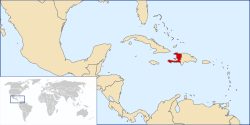Kingdom of Northern Haiti
| Kingdom of Haiti | ||||||||||
|
Royaume d'Haïti Ini an Ayiti |
||||||||||
|
||||||||||
|
||||||||||
|
Motto Ex cineribus nascitur (Latin) "Reborn from the ashes" |
||||||||||
| Capital | Cap-Henri | |||||||||
| Languages | French, Haitian Creole | |||||||||
| Religion | Roman Catholic | |||||||||
| Government | Monarchy | |||||||||
| King | ||||||||||
| • | 1811–1820 | Henri I | ||||||||
| History | ||||||||||
| • | Established | 28 March 1811 | ||||||||
| • | Disestablished | 8 October 1820 | ||||||||
| Currency | Haitian livre, Haitian gourde (as of 1813) | |||||||||
|
||||||||||
| Today part of |
|
|||||||||
The Northern Kingdom of Haiti (French: Royaume d'Haïti, Haitian Creole: Ini an Ayiti) was the state established by Henri Christophe on 28 March 1811 when he was self-proclaimed as King Henri I after having previously ruled as president. This was Haiti's second attempt at monarchical rule, as Jean-Jacques Dessalines had previously ruled over the Empire of Haiti. Following the assassination of Emperor Jacques, the country was split. Henri ruled over the north of the country as President of the State of Haiti and Alexandre Pétion, a free person of color, ruled as President of the Republic of Haiti in the south.
During his reign, Henry built six castles, eight palaces (including the Sans-Souci Palace and the Citadelle Laferrière fortress, built to protect the Kingdom from possible French invasions. He created a noble class and appointed four princes, eight dukes, 22 counts, 37 barons and 14 chevaliers.
Following a stroke and with support for his rule waning, Henry I committed suicide on 8 October 1820. He was buried at the Citadelle Laferrière. His son and heir, the Jacques-Victor Henry, Prince Royal of Haiti, was assassinated 10 days later at the Sans-Souci Palace by revolutionaries.
The general Jean-Pierre Boyer was named the successor to Alexandre Pétion in the southern Republic of Haiti. He became President, reunited the two parts of the country and ruled until 1843.
...
Wikipedia



